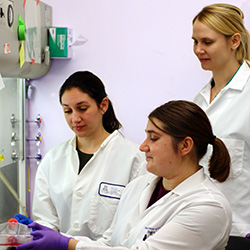Chapter of Graduate Women in Science Established
Three researchers at the Phoenix Biomedical Campus are bringing a chapter of the Graduate Women in Science Organization to the Arizona science and research community.

“I wasn’t quite sure how to network, so I thought, ‘I’ll go into an organization that is specific to empowering women in research and in science’. I also wanted to have an emphasis on outreach and promoting STEM, especially among girls and women,” Hinz-Nordlie said.
Both Hinz-Nordlie and Magee were previously members of Graduate Women in Science chapters in different states and felt that it would be beneficial to create a chapter in Arizona.
“There seemed to be a gap in this graduate trainee program, especially for women, and GWIS presented an opportunity,” said Madhavpeddi.
Graduate Women in Science is an international organization that brings women in science and research together for networking, mentoring and community outreach.
The group was created in 1921 at Cornell University and has expanded both internationally and domestically. The Arizona chapter of GWIS plans to have networking, professional development, social and outreach events.
If you’d like to get involved, contact @email.
About the College
Founded in 2007, the University of Arizona College of Medicine – Phoenix inspires and trains exemplary physicians, scientists and leaders to advance its core missions in education, research, clinical care and service to communities across Arizona. The college’s strength lies in our collaborations and partnerships with clinical affiliates, community organizations and industry sponsors. With our primary affiliate, Banner Health, we are recognized as the premier academic medical center in Phoenix. As an anchor institution of the Phoenix Bioscience Core, the college is home to signature research programs in neurosciences, cardiopulmonary diseases, immunology, informatics and metabolism. These focus areas uniquely position us to drive biomedical research and bolster economic development in the region.
As an urban institution with strong roots in rural and tribal health, the college has graduated more than 1,000 physicians and matriculates 130 students each year. Greater than 60% of matriculating students are from Arizona and many continue training at our GME sponsored residency programs, ultimately pursuing local academic and community-based opportunities. While our traditional four-year program continues to thrive, we will launch our recently approved accelerated three-year medical student curriculum with exclusive focus on primary care. This program is designed to further enhance workforce retention needs across Arizona.
The college has embarked on our strategic plan for 2025 to 2030. Learn more.